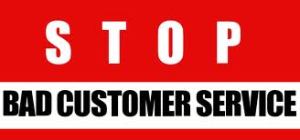“Sorry, I ordered the Vertigo Combo-Meal”
“100% Customer Satisfaction” was the ethic I had to extoll, promote, and drive into the heads of roomfuls of folks for quite some time. I was a corporate trainer, hired into the field from management, and this was my job. Also, for a number of years I was a business owner, and I had to keep my supporters happy. I read books on service, observed it and analyzed it as a topic, and did everything I could to get my audience on board. It was fortified by a decade-plus time in the trenches in different versions of the industry. I will point out the elephant in the room right now; it’s too obvious not to. It’s all about the DC Comics, BUT it applies to other such companies, and seems to be on the decline in many other arenas. The idea seems to have been askew for a while when it comes to folks who publish comics who have forgotten their place in the social agreement. I’ve seen too much happen in the past couple of years that would lead me to make these observations. Publishers are NOT performers or entertainers and need to lose their egos and celebrity status and we need to stop treating them as such. I speak now to the actual parties this should be directed to:
Men and Women- You are involved in retail. You are customer service representatives, no more, no less. You hire creative individuals to produce a product your customer’s want. They should be trusted to do this, based on your information about what we are looking for. “The customer’s perception is YOUR reality”. You would seem to be expecting us to adapt to YOU, when the opposite should ALWAYS be the case. Stop telling us what we are going to love. Ask us what we would love. Listen to us, because we know. We can only provide the skeleton of it. We don’t have the answers as to how you do it, that’s YOUR job. You take our wants, then surprise us with the approach while giving us the un-forseen, and exceed our expectations. Service is not about adequacy. It’s about going beyond and ‘wowing’ the consumer. It is not our job to tell you how, it is your’s to figure it out. This ensures our loyalty and engagement, which should ALWAYS be your goal. That is the job of product creators, and again, it requires knowledgable craftspeople to make this happen. Also, if you do not treat them well, they will and do defect. They are your strongest asset in serving our needs and should be praised and rewarded for their good works, always. Your audience wants something artful, and we know when that’s not what we’re being given. People love fads for a while, but they burn out. Fashion lasts, and trendy properties are not exhibiting the level of quality to keep us invested.
 We should be the first people looked and listened to when major changes are afoot. We should be consulted and polled. Are groups of us from different walks being brought in to assess the decisions and give feedback? Where is the ‘comment card’, here? I would think bloggers and such would be your consultants. We have our fingers on the pulse with the research we do, our passion for the subject, and the opinions we receive. Does anyone do ‘mystery shopping’, a common retail practice, or the like? In your case, I would think someone would visit large venues like Midtown Comics in Manhattan to hear first hand what the people keeping roofs over your heads are saying about your product, taking good notes, and reporting the findings back to management who should be all-ears.
We should be the first people looked and listened to when major changes are afoot. We should be consulted and polled. Are groups of us from different walks being brought in to assess the decisions and give feedback? Where is the ‘comment card’, here? I would think bloggers and such would be your consultants. We have our fingers on the pulse with the research we do, our passion for the subject, and the opinions we receive. Does anyone do ‘mystery shopping’, a common retail practice, or the like? In your case, I would think someone would visit large venues like Midtown Comics in Manhattan to hear first hand what the people keeping roofs over your heads are saying about your product, taking good notes, and reporting the findings back to management who should be all-ears.
Pop-culture fans are not one lump. Every group is varied from the other. Do not assess the potential of your product on other fare that does not equate. Every group has it’s loyalists and fans, many of whom are already getting the element they are looking for with their prime choice. Alienating your base to pursue another based on their past purchases that are not translations of what you offer will rarely lead to a pay-off to offset your losses. In tandem, when a direct competitor in the same market achieves quantifiable successes, observe the elements. Do not pursue items that would defeat what makes you unique, but embrace what can be adopted and enrich the experience of your customers.
 Do not take your products and bundle them if they are not the same type of product. With creative products as the commodity, some people will not like some of your offerings, where others may. Don’t try to tie them all together if it diffuses the potency of either product. Every product should be offered as an individual unit, and only concepts that are adjacent and complimentary merge well. Diversify, and don’t put too many eggs in one basket. Don’t hold one particular facet to be of a certain advertised number of products. Several lines would be optimal, instead of one big one with tiny satellite services; the latter is a faulty model. A quality offering of many venues allows your consumers to make better and wider choices. Feeding everyone from the same pool is foolhardy and treats in-equals as equals. We would rather have 10 great choices in a vein than 50+ mediocre ones with limited alternatives. This goes to the statements earlier about gauging our desires for what we want. We get accused as consumers of not knowing what we want, and I will say that’s a half truth. It’s up to you to figure out conquering the divide. Giving us more lines is a great way to address this, and I would say there is a likelihood that many will opt to pursue more than just one of these groups, if they are done well.
Do not take your products and bundle them if they are not the same type of product. With creative products as the commodity, some people will not like some of your offerings, where others may. Don’t try to tie them all together if it diffuses the potency of either product. Every product should be offered as an individual unit, and only concepts that are adjacent and complimentary merge well. Diversify, and don’t put too many eggs in one basket. Don’t hold one particular facet to be of a certain advertised number of products. Several lines would be optimal, instead of one big one with tiny satellite services; the latter is a faulty model. A quality offering of many venues allows your consumers to make better and wider choices. Feeding everyone from the same pool is foolhardy and treats in-equals as equals. We would rather have 10 great choices in a vein than 50+ mediocre ones with limited alternatives. This goes to the statements earlier about gauging our desires for what we want. We get accused as consumers of not knowing what we want, and I will say that’s a half truth. It’s up to you to figure out conquering the divide. Giving us more lines is a great way to address this, and I would say there is a likelihood that many will opt to pursue more than just one of these groups, if they are done well.
Recognize the customer’s sphere of purchases, and your role in their lives. You are not providing a necessity. You do nothing for the livelihood of your purchasers. Your offerings are elective, 100%. That is why losing their support is a constant concern, especially in economically disparaging times. Our dollars are votes, and angling for that is most wise.
Working under money-folk who do not understand the nature of the customer is frustrating. They somehow need to be made to understand that sales-bumps have a low on the other side, and stringing us with gimmicks will not work. Consistently good product will give better sales for much longer times. Gimmicks have been shown to be successful in the past for short bursts, and companies have gone almost a full decade trying to climb back from the fall-out. Also, ventures that were too big to fail 20 years ago are not around today and are a footnote in the industry. Conversely, look at what has worked if you need to quantify it for your superiors. Observe how many products from the past have not only stood the test of time, but have been re-presented in various formats, media, and are part of broad discussions about other aspects of culture. Past work has been so sought out that it appears in places that don’t even carry your base product. That is quantifiable, and shows an asset that still pans out. Also, those commodities reach new consumers, not just old ones. If you observe fashion over fad, it’s easy to see that it’s timeless nature feeds itself indefinitely.
 Internally, there is a double-edged sword to veteran employees. Wizened, tenured folks who can objectify what’s happening and make observations based on cycles they’ve witnessed are a gold-worthy asset. Jaded, self-important senior members can kill a business. If someone is convinced they are indispensable due to former glories that are no longer relevant and they are bringing no refreshing insights to their less-tenured peers, they must be shown the door, and replaced with folks who are enthusiastic and energized about the field they are pursuing. Dinosaurs kill morale and are often more stuck on ego than pleasing customers. Fresh, optimistic eyes are great for growth, especially when they are focused on the contentment of their public. Sentimentalism shouldn’t be a welcome practice in business management, loyalty for services rendered are great until the fault becomes apparent.
Internally, there is a double-edged sword to veteran employees. Wizened, tenured folks who can objectify what’s happening and make observations based on cycles they’ve witnessed are a gold-worthy asset. Jaded, self-important senior members can kill a business. If someone is convinced they are indispensable due to former glories that are no longer relevant and they are bringing no refreshing insights to their less-tenured peers, they must be shown the door, and replaced with folks who are enthusiastic and energized about the field they are pursuing. Dinosaurs kill morale and are often more stuck on ego than pleasing customers. Fresh, optimistic eyes are great for growth, especially when they are focused on the contentment of their public. Sentimentalism shouldn’t be a welcome practice in business management, loyalty for services rendered are great until the fault becomes apparent.
For an analogy of the current state of affairs, observe Coke vs. Coke Classic. Coca-Cola changed their formula, and their public was very unhappy. They brought out “Coke Classic” to appease the decrying masses. It worked exponentially. The lesson was not only learned, but it brought them great success; more than they’d had before, in fact. Giving the crowd what they really want is ultimately what you should be after. Lastly, ‘Fess up when you mess up’. Apologies will instill loyalty, especially when they carry concessions. Tell me when something didn’t work and the ball was dropped. Don’t make excuses, but offer sincere perspective-offering explanations, and do not pass any blame. Then, give me a token to show me you still want my business, and I will gladly attempt to reconcile and support your business again.
Save yourselves, DC- and win us all back!
FILL OUT MY COMMENT CARD BY LEAVING ANY ARGUMENTS/APPRAISALS/PRAISES/CONDEMNATIONS IN THE COMMENTS SECTION!

